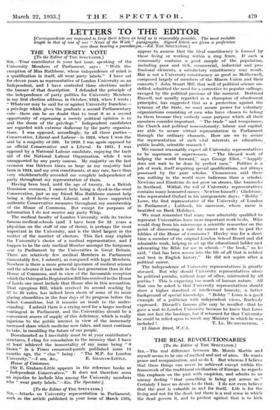LETTERS TO THE EDITOR [Correspondents are requested to keep their
letters as brief as is reasonably possible. The most suitable length is that of one of our " News of the Week " paragraphs. Signed letters are given a preference over those bearing a pseudonym.—Ed. TILE SPECTATOR.] THE UNIVERSITY VOTE [To the Editor of THE SPECTATOR.] StR,—Your contributor in your last issue, speaking of the University Members of - Parliament, says : " With the
exception of Miss Rathbone, whose independence of mind is a qualification in itself, all wear party labels." I have sat for eleven years as representative of London University as an Independent, and I have contested three elections under the banner of that description. I defended the principle of the independence of party politics for University Members in my first election address, in October, 1924, when I wrote : " Whatever may be said for or against University franchise— a privilege which gives the graduate a second Parliamentary vote—there can be no doubt that to treat it as a second opportunity of expressing a merely political opinion is to seal the doom of the privilege." Independent candidates are regarded with extreme disfavour by the party organiza- tions. I was opposed, accordingly, by all three parties— Conservative, Liberal and Labour—in 1924, when I won the seat by a majority of 389. In 1929, I was again opposed by an official Conservative and a Liberal. In 1931, I was opposed by a National Labour candidate, enjoying the tacit aid of the National Labour Organization, while I was unsupported by any party caucus. My majority on the last occasion was thirteen times as large as my majority had been in 1024, and my own constituents, at any rate, have thus very wholeheartedly accorded me complete independence of party throughout my representation of them. , Having been bred, until the age of twenty, in a British
Dominion overseas, I cannot help being a dyed-in-the-wool Conservative, just as my friend Miss Rathbone cannot help being a dyed-in-the-wool Liberal, and I have supported authentic Conservative measures throughout my membership of the House of Commons. But except for purposes of information I do not receive any party Whip.
The medical faculty of London University with its twelve
famous medical schools (and I have been for 32 years a physician on the staff of one of them), is perhaps the most important in the University, and is the third largest in the matter of the number of electors. This fact may explain the University's choice of a medical representative, and I happen to be the only medical Member amongst the burgesses sent to Parliament by the Universities in Great Britain. There are relatively few medical Members in Parliament (lamentably few, I submit), as compared with legal Members. Nowhere is there a more general ignorance of medical science and the advance it has made in the last generation than in the House of Commons, and in view of the favourable reception which the Osteopaths Registration Bill has received in the House of Lords one must include that House also in this accusation. That egregions• Bill, which received its second reading by 37 to 20 votes, has indeed been Shorn of some of its more glaring absurdities in the four days of its progress* before the Select Committee, bid it remains an insult to the Under- standing. I, submit there is a crying need for a larger medical contingent in Parliament, and the,Uniirersities should be a convenient source of supply of this deficiency, which is really injurious to the public interest in view of the immensely increased share which medicine now takes, and must continue to take, in moulding the future of our people. .
Downhearted as I inevitably must be at your contributor's strictures, I cling for consolation to the memory that I have at least 'achieved the immortality of my , name being .." 9
Doivn" in crossivord-puzzle published some 18 months ago, -the " clue " being : " The M.P. for London House of Commons.
[Sir E. Graham-Little, appears in the reference books as " Independent Conservative:" It does not therefore seem an injustice to include him among the University members who " wear party labels."—En. The Spectator.]




























































 Previous page
Previous page